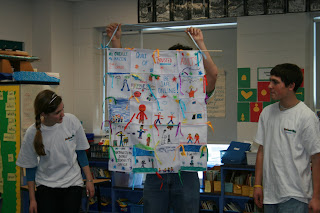Now, the staff sustain their progress through several strategies. Collaborative Conference is a biweekly meeting of each grade-level team with Forest Lake's tech-integration triumvirate: Scullion, Williams, and library-media specialist Lizzie Padget. Teams use these meetings to address problems and plan their study units, brainstorming ideas for the pre-unit assessment, technology components, and hands-on experiences. Williams also serves as a real-time tech supporter, available to fight fires, coach teachers individually, or stand by in their classrooms while they try something new.
Monthly staff meetings are another essential venue for ongoing training. Scullion, Williams, and Padget often ask teachers to showcase the innovations that are working in their classrooms. Lowe, for instance, is the first to experiment with blogs in second grade. Scullion intends to ask her to teach her technique at an upcoming meeting. "Innovations seem more attainable if you see people next door doing them," she explains.


 Cached
Cached

